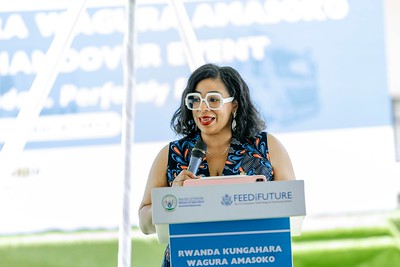In a combined trouble to reduce losses in the import of perishable agrarian products, USAID has partnered with original growers and exporters through the Feed the unborn- Kungahara Markets Project. This action involves the provision of cooled exchanges, designed to ameliorate the cold chain from the ranch to the National Agricultural Export Development Board( NAEB). The thing is to insure that fruits and vegetables arrive in transnational requests in optimal condition, conserving their quality during transport.
On Wednesday, November 6, 2024, the delivery of nine cooled exchanges to Rwandan growers was marked by a significant event. These vehicles, intended for growers who grow vegetables and fruits for import, represent a pivotal step in perfecting the cold chain system. The new exchanges are anticipated to help save the quality of agrarian yield by precluding corruption caused by shy refrigeration during transport — a patient issue that had preliminarily redounded in substantial fiscal losses for growers. By addressing this problem, USAID hopes to bolster Rwanda’s agrarian import capacity and insure that growers can more contend in the global request.
Bizimana Claude, the Director General of the NAEB, stressed the significance of these exchanges in working a longstanding challenge within the agrarian import sector.” Some of our agrarian exports are perishable, and without proper refrigeration, they deteriorate before reaching the request,” Bizimana stated. He emphasized that this action will help address those challenges by icing that fruits and vegetables retain their high quality from the ranch to the transnational request. Prior to the appearance of these cooled exchanges, growers frequently faced difficulties transporting perishable goods to NAEB and other import points. This challenge redounded in damaged or putrefied products that were infelicitous for global requests, leading to fiscal losses for growers.

” The new refrigerated vehicles will significantly ameliorate the situation, icing that fruits and vegetables maintain their newness and meet transnational norms,” Bizimana explained. This intervention is anticipated to revise how Rwandan growers handle perishable exports, eventually leading to lesser success in transnational requests. The new vehicles are equipped with advanced refrigeration technology that will allow growers to maintain the integrity of their yield, indeed over long distances and through colorful rainfall conditions. By icing that yield stays fresh during conveyance, the new exchanges will help Rwandan growers minimize waste, maximize gains, and enhance the country’s overall agrarian import quality.
One of the donors of the new refrigerated exchanges, Twinokusima John, the Chief Financial Officer of Bahage Food Ltd., participated how the action would profit his company’s operations.” preliminarily, we used aged, unreliable vehicles, which frequently led to the deterioration of our crops during transportation,” said Twinokusima.” With the new refrigerated exchanges, we can now deliver our yield to NAEB in excellent condition, reducing losses and maintaining the quality anticipated by our guests.” He refocused out that these new vehicles would not only ameliorate the effectiveness of their operations but also help insure that their products meet the high norms set by transnational buyers. With the confidence that their yield would reach the request in top condition, Twinokusima expressed a renewed sense of sanguinity for the future of his business.
The provision of cooled transport is particularly pivotal for import growers like Twinokusima, whose livelihoods depend on the quality of their crops.” Agriculture is a parlous business, especially for those of us exporting goods,” Twinokusima explained.However, we risk going void,” If the products are n’t duly handled.” He underlined the significance of proper refrigeration, which can mean the difference between profitability and fiscal ruin. With the new refrigerated exchanges, growers now have the assurance that their yield will arrive at transnational requests fresh and complete, therefore reducing the pitfalls they face.” But with these new exchanges, we now have confidence that our yield will reach transnational buyers in top condition,” he added.


USAID’s representative in Rwanda and Burundi, KEISHA Effiom, also spoke about the broader impact of the action. She emphasized that this cooperation between USAID and original growers is about further than just furnishing outfit.” It’s aimed at enhancing the quality of Rwanda’s agrarian exports and fostering stronger connections with growers in the sector,” Effiom said. The action is part of USAID’s ongoing commitment to supporting Rwanda’s agrarian development and icing that growers have the tools they need to succeed in the competitive global business. Effiom also stressed the positive ripple goods of this action, noting that it would not only reduce losses but also help to produce a more flexible and sustainable agrarian sector in Rwanda.
The accession of the refrigerated exchanges is part of a larger design funded by USAID, which contributes 60 of the backing, while growers themselves give the remaining 40. This collaboration is a crucial element in strengthening Rwanda’s agrarian import capacity and icing long- term growth. By participating the fiscal responsibility, the design encourages growers to take power of their success while entering critical support from USAID. This participated investment fosters a sense of collaborative responsibility among growers and incentivizes them to maintain high norms of quality in their yield.
With the new refrigerated vehicles, Rwanda’s agrarian sector is poised to make significant strides in reducing waste, perfecting the quality of its exports, and strengthening its position in the global business. The cooperation between USAID, original growers, and exporters serves as a model for how targeted support and collaboration can help address some of the most burning challenges in agrarian import. By enhancing the cold chain and icing that yield remains fresh during transport, this action helps growers increase their competitiveness, meet transnational norms, and boost their income eventuality.

The provision of these cooled exchanges also supports the government’s broader sweats to contemporize and expand Rwanda’s agrarian sector. Agriculture is a crucial pillar of the Rwandan frugality, and perfecting the import of high- quality yield is essential for the country’s long- term profitable growth. By perfecting structure and furnishing growers with the tools they need to succeed, the government and its mates are creating a more sustainable agrarian system that benefits both growers and the public frugality as a whole.
The cooperation between USAID, the NAEB, and original growers marks a significant corner in Rwanda’s agrarian development. The provision of cooled exchanges is a pivotal intervention that will help reduce losses in the import of perishable agrarian products, ameliorate the quality of exports, and insure that growers can contend effectively in global requests. As Rwanda continues to invest in its agrarian sector, enterprise like this bone
will play a vital part in icing sustainable growth and fostering lesser substance for the country’s growers and the frugality as a whole. The success of this action underscores the significance of collaboration, invention, and investment in erecting a more flexible and competitive agrarian sector in Rwanda.



